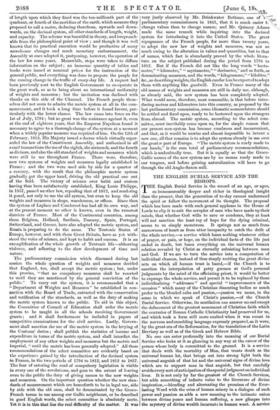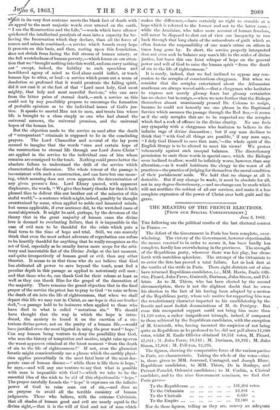THE ENGLISH BURIAL SERVICE AND THE BISHOPS.
THE English Burial Service is the record of an age, or ages, so immeasureably deeper and richer in theological insight than the present, that the generation of to-day cannot understand the spirit or follow the movement of its thought. The proposal which has been made with such general applause in the House of Lords to clip it to suit the scruples of men who have made up their minds, that whether God wills to save or condemn, they at least will not sanction the least ray of hope for the dying criminal, seems to us simply monstrous. It springs not so much from narrowness of heart as from utter incapacity to catch the drift of the whole service,—a service which bases nothing whatever either of prayer, or pain, or hope, on the individual facts of the life just ended in death, but bases everything on the universal human relation revealed by Christ as eternally subsisting between man and God. if we are to turn the service into a computation of individual chances, instead of thus simply reciting the great divine acts on which all human trust is based,—if the Church is to sanction the interpolation of petty guesses at God's personal judgments by the mind of the officiating priest, it would be better to expunge the whole service, and permit it to be replaced by those individualizing " addresses " and special "improvements of the occasion" which many of the Christian dissenting bodies so much prefer to the blended calm and passion,—passion we mean, in the sense in which we speak of Christ's passion,—of the Church Burial Service. Otherwise, its mutilation can answer no end except the defacement of the greatest monument of Christian faith which the centuries of Roman Catholic Christianity had preserved for us, and which took a form still more exalted when it was recast in the nervous and ennobling language expressly prepared, as it were, by the great era of the Reformation, for the translation of the Latin Breviary as well as of the Greek and Hebrew Bible.
No one can enter profoundly into the meaning of our Burial Service who looks at it as glancing in any way at the career of the person whose body is committed to the ground. It is a service that deals with the mortality of Man, that treats death as the universal human lot, that brings out into strong light both the universal anguish of that lot and the universal signs of divine love which are to support man in that anguish, but that carefully avoids every sort of anticipation of the special judgment on individual lives. It is not only by far the greatest of the Church Services, but adds something of infinite value to the literature of divine inspiration,—blending and alternating the promises of the Ever- lasting Word with the cries of human misery in a dialogue of such power and passion as adds a new meaning to the intimate union between divine peace and human suffering, a new glimpse into the mystery of divine wealth incarnate in human want. A service
vt ch in its very first sentence meets the blank fact of death with n appeal to the most majestic words ever uttered on the earth, "I am the Resurrection and the Life,"—words which have oftener quickened the intellectual paralysis of man into a capacity for be- lieving the Incarnation which they declare, than all the force of reason and miracle combined,—a service which founds every hope it presents on this basis, and then, resting upon this foundation, does not shrink from facing the full stream of human misery, or the full wretchedness of human poverty,—which forces on our atten- tion that we "brought nothing into this world, and can carry nothing out" except, indeed, the liability to such speechless and bewildered agony of mind as God alone could inflict, or teach human lips to utter, or heal—a service which pours out a sense of desolation so profound that it would prostrate the failing spirit, did it not cast it at the feet of that " Lord most holy, God most mighty, that holy and most merciful Saviour," who can save from the bitter pains of eternal death,—such a service as this could not by any possibility propose to encourage the formation of probable opinions as to the individual issues of God's jus- tice. It speaks to mortal Man not to men, and treats him whose life is brought to a close simply as one who had shared the universal sorrows, the universal promises, and the universal hopes of the human lot.
But the objection made to the service as used after the death of " unrepentant " criminals is supposed to lie in the concluding prayers. The Lord Chancellor and saveral of the lay peers seemed to imagine that the words "sure and certain hope of the resurrection to eternal life through our Lord Jesus Christ" are applied in the service to the individual case of him whose remains are consigned to the tomb. Nothing could prove better the absolute failure to understand the drift of the service which characterized the dispussion. The whole tenour of the passage is inconsistent with such a construction, and can have but one mean- ing, which meaning does not even approach the determination of any given person's fate. Lord Ebury quoted, with apparent displeasure, the words, "We give thee hearty thanks for that it hath pleased thee to deliver this our brother out of the miseries of this sinful world,"— a sentence which might, indeed, possibly be thought overstrained by some, when applied to noble and lamented minds, but seems applicable, if ever sentence did, to the wretched cases of moral shipwreck. It might be said, perhaps, by the devotees of the theory that in the great majority of human cases the divine love is doomed to everlasting failure, that it is impossible in the case of evil men to be thankful for the crisis which puts a final term to the time of hope and trial. Still, we can scarcely think that even the most ardent advocate of reprobation can refuse to be heartily thankful for anything that he really recognizes as the act of God, especially as he usually leaves more scope for the arbi- trary and inscrutable fiat of the Divine Judge at the last moment, and quite irrespectively of human good or evil, than any other theorist. It seems to us that those who do not believe that God has abdicated all power to save beyond the tomb, must feel a peculiar depth in this passage as applied to notoriously evil men ; and that those who do, can thank God for their release at least as well as they can thank Him for the gospel of the damnation of the majority. There remains the grand objection that in the final prayer of the service the priest has to pray to God "to raise us from the death of sin into the life of righteousness, that when we shall depart this life we may rest in Christ, as our hope is this our brother doth,"—a passage held to be insincere when applied to those who have died in what is called "notorious sin." We should have thought that the way in which the hope is intro- duced, the anxiety to found it on the exertion of a vic- torious divine power, not on the purity of a human life,—would have justified even the most bigoted in using the poor word "hope." Can any human being venture to deny the possibility that God, who sees the history of temptation and motive, might raise up even the worst apparent criminal at the latest moment "from the death of sin to the life of righteousness ?" If not, even the gloomiest fanatic might conscientiously use a phrase which the earthly physi- cian applies proverbially in the most fatal hour of the most des- perate case of human disease—" while there is life there is hope," he says,—and will any one venture to say that what is possible with man is impossible with God ?—which we take to be the essential idea of the wish to be rid of this objectionable "hope." The prayer carefully founds the "hope" it expresses on the infinite power of God to raise man out of sin,—and does so on purpose to avoid all the terrible casuistry of human judgments. Those who believe, with the extreme Calvinists, that all shades of human good and evil are nearly equal in the divine sight,—that it is the will of God and not of man which makes the difference,—have certainly no right to stumble at a hope which is referred to the former and not to the latter cause ; while the Arminian, who takes more account of human freedom, will never be disposed to shut out of view our incapacity to run back through that long chain of the antecedents of guilt which so often fastens the responsibility of one man's crime on others in times long gone by. In short, the service properly interpreted does not even seek to balance any man's life in the scales of divine justice, but hues this one faint whisper of hope on the general power and will of God to raise the human spirit "from the death of sin to the life of righteousness."
It is rarely, indeed, that we feel inclined to oppose any con- cession to the scruples of conscientious clergymen. But when we consider that the scruples entertained about the Athanasian anathema are always waved aside,—that a clergyman who hesitates to express not merely gloomy fears but gloomy certainties has no choice but to resign,—when we note further that the Bishops themselves almost unanimously pressed Dr. Colenso to resign, because he could not honestly use one phrase in the Baptismal Service which assumes the passage through the Red Sea,—it seems as if the only scruples that are to be respected are the scruples which find a rock of offence in the divine charity. No one feels any sympathy with a clergyman who hesitates to believe in the infinite rage of divine damnation ; but if any man declines to think that "with God all things are possible," if any man says, "I defy God Himself to save that man,"—the whole spirit of the English liturgy is to be altered to meet his views! We protest, vehemently against such unequal balances. The discretionary' permission to omit these words in special eases, which the Bishops seem inclined to allow, would be infinitely worse, however, than any alteration,—as it would habituate the clergy to the worst of all practices—the practice of judging for themselves the moral condition of their parishioners' souls. We hold that no change at all is desirable. But if any change be made, it must be absolute for all, not in any degree discretionary,—and no change can be made which will not mutilate the noblest of all our services, and make it a less complete expression of the power of Christ over both guilt and the grave.































 Previous page
Previous page